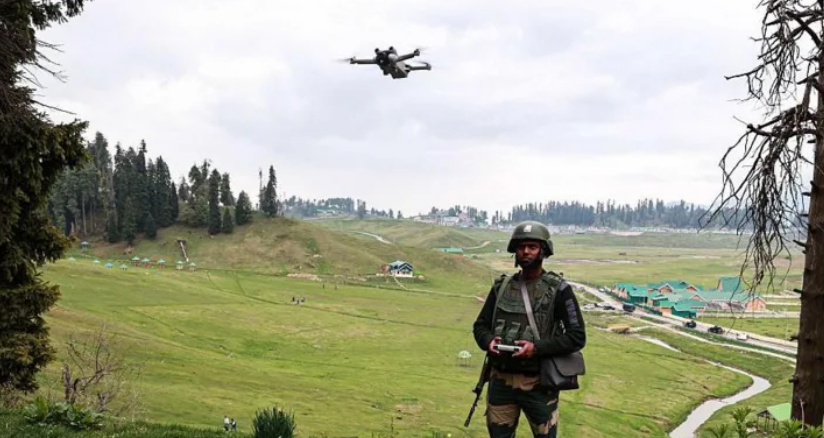Tensions between nuclear-armed neighbours India and Pakistan have reached a volatile new phase, as both sides engage in what analysts are calling the world’s first “drone war” between nuclear powers.
India on Thursday accused Pakistan of launching multiple drone and missile attacks on military installations in Indian territory and Indian-administered Kashmir. Islamabad denied the allegations and instead claimed it had downed 25 Indian drones over cities including Karachi, Lahore and Rawalpindi. Delhi has yet to respond publicly to Pakistan’s claims.
The drone warfare comes amid escalating military exchanges and deepening mistrust between the two long-time rivals. Since Wednesday, Pakistan says Indian strikes have killed 36 people in Pakistan and Pakistan-administered Kashmir, while Indian officials report 16 civilian deaths from Pakistani shelling. India says its actions were in retaliation for a deadly militant attack on Indian tourists in Pahalgam last month — an attack Pakistan denies involvement in.
The drone operations on both sides signal a shift in South Asia’s military landscape, where unmanned aerial vehicles (UAVs) are playing a growing role in surveillance, targeting, and even direct strikes.
“This conflict is moving into a drone era,” said Professor Jahara Matisek of the US Naval War College. “The side that masters drone warfare won’t just see the battlefield — they’ll shape it.”
India’s drone fleet includes Israeli-made Harop and Heron drones, used for loitering attacks and high-altitude surveillance. Pakistan’s arsenal is more diverse, featuring over a thousand drones sourced from China, Turkey, and domestic manufacturers, including the CH-4, Bayraktar Akinci, and the Burraq.
Pakistan claims the intercepted Indian drones were Israeli Harops, shot down using a combination of jamming and direct strikes. India reportedly targeted Pakistani air defence systems in response, including an installation in Lahore — though Pakistan denies this.
Experts warn that while drones offer a lower-risk alternative to manned aircraft, they could also lower the threshold for escalation. “Every drone downed or radar blinded becomes a flashpoint,” said Prof Matisek.
Global powers, including the US, have called for restraint as fears mount over a broader conflict. “This could be the beginning of a more intense confrontation — or it could de-escalate. Both outcomes remain possible,” said Indian defence analyst Manoj Joshi.
With both countries still using traditional artillery and missiles alongside unmanned systems, analysts say the region stands at a dangerous crossroads. Whether drones signal a tactical evolution or a precursor to larger conflict remains to be seen.

















